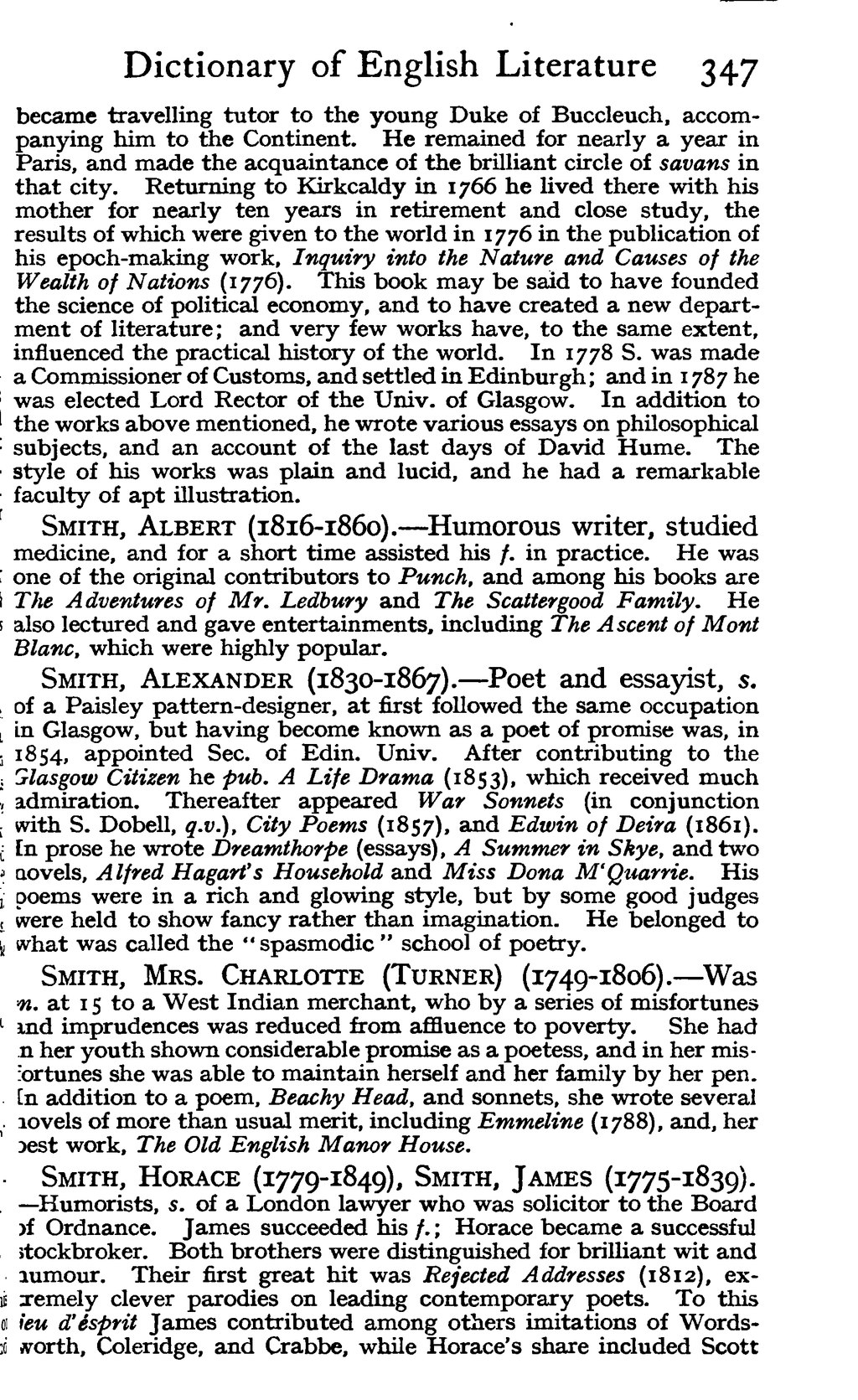and became travelling tutor to the young Duke of Buccleuch, accompanying him to the Continent. He remained for nearly a year in Paris, and made the acquaintance of the brilliant circle of savans in that city. Returning to Kirkcaldy in 1766 he lived there with his mother for nearly ten years in retirement and close study, the results of which were given to the world in 1776 in the publication of his epoch-making work, Inquiry into the Nature and Causes of the Wealth of Nations (1776). This book may be said to have founded the science of political economy, and to have created a new department of literature; and very few works have, to the same extent, influenced the practical history of the world. In 1778 S. was made a Commissioner of Customs, and settled in Edinburgh; and in 1787 he was elected Lord Rector of the Univ. of Glasgow. In addition to the works above mentioned, he wrote various essays on philosophical subjects, and an account of the last days of David Hume. The style of his works was plain and lucid, and he had a remarkable faculty of apt illustration.
Smith, Albert (1816-1860).—Humorous writer, studied medicine, and for a short time assisted his f. in practice. He was one of the original contributors to Punch, and among his books are The Adventures of Mr. Ledbury and The Scattergood Family. He also lectured and gave entertainments, including The Ascent of Mont Blanc, which were highly popular.
Smith, Alexander (1830-1867).—Poet and essayist, s. of a Paisley pattern-designer, at first followed the same occupation in Glasgow, but having become known as a poet of promise was, in 1854, appointed Sec. of Edin. Univ. After contributing to the Glasgow Citizen he pub. A Life Drama (1853), which received much admiration. Thereafter appeared War Sonnets (in conjunction, with S. Dobell, q.v.), City Poems (1857), and Edwin of Deira (1861). In prose he wrote Dreamthorpe (essays), A Summer in Skye, and two novels, Alfred Hagart's Household and Miss Dona M'Quarrie. His poems were in a rich and glowing style, but by some good judges were held to show fancy rather than imagination. He belonged to what was called the "spasmodic" school of poetry.
Smith, Mrs. Charlotte (Turner) (1749-1806).—Was m. at 15 to a West Indian merchant, who by a series of misfortunes and imprudences was reduced from affluence to poverty. She had in her youth shown considerable promise as a poetess, and in her misfortunes she was able to maintain herself and her family by her pen. In addition to a poem, Beachy Head, and sonnets, she wrote several novels of more than usual merit, including Emmeline (1788), and, her best work, The Old English Manor House.
Smith, Horace (1779-1849), Smith, James(1775-1839).—Humorists, s. of a London lawyer who was solicitor to the Board of Ordnance. James succeeded his f.; Horace became a successful stockbroker. Both brothers were distinguished for brilliant wit and humour. Their first great hit was Rejected Addresses (1812), extremely clever parodies on leading contemporary poets. To this jeu d'esprit James contributed among others imitations of Wordsworth, Coleridge, and Crabbe, while Horace's share included Scott
